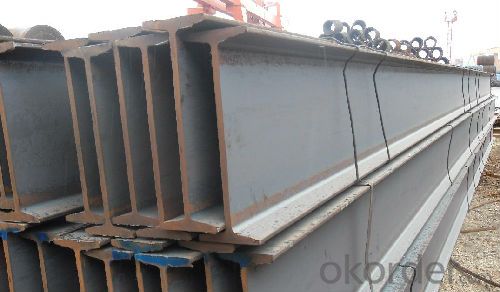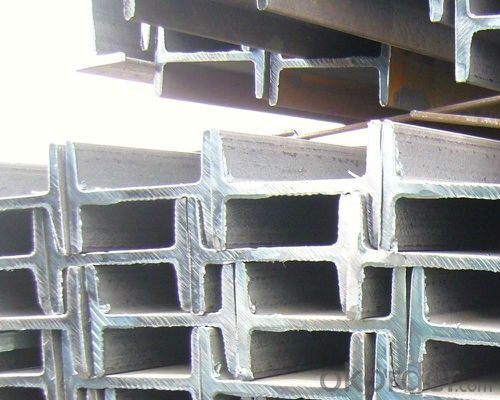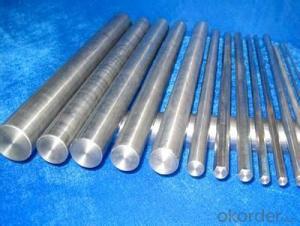Round Bar Q235 3MM-25MM High Quality Hot Rolled GB
- Loading Port:
- Shanghai
- Payment Terms:
- TT or LC
- Min Order Qty:
- 25 m.t.
- Supply Capability:
- 2000000 m.t./month
OKorder Service Pledge
OKorder Financial Service
You Might Also Like
OKorder is offering high quality Hot Rolled Steel I-Beams at great prices with worldwide shipping. Our supplier is a world-class manufacturer of steel, with our products utilized the world over. OKorder annually supplies products to European, North American and Asian markets. We provide quotations within 24 hours of receiving an inquiry and guarantee competitive prices.
Product Applications:
1) Suitable for making various strong cutting tool abrasion resistance, impact resistance.
2) Used to produce all kinds of high hard and super hard saw blade, drill, tap, broach, gear hob and various kinds of milling cutter.
3) Used for advanced punching die, screw die, and the toughness and complicated shape of the punch, etc.
4) Is used for cold forging die and drawing mode, etc.
5) Recommended watchcase factory, screw factory and other cold stamping products industry use.
Product Advantages:
OKorder's Steel I-Beams are durable, strong, and resist corrosion.
Main Product Features:
· Premium quality
· Prompt delivery & seaworthy packing (30 days after receiving deposit)
· Corrosion resistance
· Can be recycled and reused
· Mill test certification
· Professional Service
· Competitive pricing
Product Specifications:
1. Grade: GB, JIS, ASTM, EN
2. Grade: Q235, SS400, A36, S235JR
3. Diameter and mass: As below
Diameter | Mass | Diameter | Mass | Diameter | Mass |
(mm) | (kg/m) | (mm) | (kg/m) | (mm) | (kg/m) |
6 | 0.22 | 22 | 2.98 | 53 | 17.30 |
7 | 0.30 | 24 | 3.55 | 56 | 19.30 |
8 | 0.40 | 25 | 3.85 | 60 | 22.20 |
9 | 0.50 | 26 | 4.17 | 63 | 24.50 |
10 | 0.62 | 28 | 4.83 | 65 | 26.00 |
11 | 0.75 | 30 | 5.55 | 70 | 30.20 |
12 | 0.89 | 32 | 6.31 | 75 | 34.70 |
13 | 1.04 | 34 | 7.13 | 80 | 39.50 |
14 | 1.21 | 36 | 7.99 | 85 | 44.50 |
15 | 1.39 | 38 | 8.90 | 90 | 49.90 |
16 | 1.58 | 40 | 9.86 | 95 | 55.60 |
17 | 1.78 | 42 | 10.90 | 100 | 61.70 |
18 | 2.00 | 45 | 12.50 | 120 | 88.85 |
19 | 2.23 | 48 | 14.20 | 140 | 120.93 |
20 | 2.47 | 50 | 15.40 | 150 | 138.82 |
4. Material: Mild Steel
5. Heat treatment of high quality steel:
Fire: Isothermal annealing temperature is 800 ~ 880 °C, with 10 ~ 20 °C, the furnace cooling to about 600 °C, hardness above HB269.
Preheat temperature: 730-730 °C
Quenching temperature: 1190-1210 °C
Tempering temperature: 540-595 °C
Cold drawn, hardness 285 HBS
Cold drawn after annealing condition, hardness 277 HBS
Quenching methods: oil quenching, air cooling or salt bath quenching
FAQ:
Q1: Why buy Materials & Equipment from OKorder.com?
A1: All products offered byOKorder.com are carefully selected from China's most reliable manufacturing enterprises. Through its ISO certifications, OKorder.com adheres to the highest standards and a commitment to supply chain safety and customer satisfaction.
Q2: How do we guarantee the quality of our products?
A2: We have established an advanced quality management system which conducts strict quality tests at every step, from raw materials to the final product. At the same time, we provide extensive follow-up service assurances as required.
Q3: How soon can we receive the product after purchase?
A3: Within three days of placing an order, we will begin production. The specific shipping date is dependent upon international and government factors, but is typically 7 to 10 workdays.


- Q:Are steel round bars resistant to corrosion?
- The corrosion resistance of steel round bars can vary depending on the type of steel and the environment in which they are placed. For instance, stainless steel round bars consist of chromium, which creates a protective layer on the surface, shielding against corrosion. This protective layer is capable of self-repair and offers exceptional resistance to corrosion in various environments, such as those with moisture, chemicals, or saltwater. Conversely, carbon steel round bars do not possess inherent corrosion resistance and might necessitate additional protective coatings or treatments to prevent corrosion. Hence, it is crucial to consider the specific steel type and intended application when evaluating the corrosion resistance of steel round bars.
- Q:Can steel round bars be polished?
- Yes, steel round bars can be polished. Polishing steel round bars involves using abrasive materials, such as sandpaper or polishing compounds, to remove any imperfections or rough surfaces on the bar's surface. This process can be done by hand or with the help of machinery specifically designed for polishing metals. The end result is a smooth and shiny surface on the steel round bar. However, it is important to note that the type of steel and the desired finish will determine the specific polishing techniques and materials required.
- Q:What are the different surface hardness options for steel round bars?
- Steel round bars can have varying levels of surface hardness depending on the specific requirements and applications. Some of the different surface hardness options for steel round bars include: 1. Soft or annealed: This is the lowest level of surface hardness, where the steel is heated and then slowly cooled to reduce internal stress and increase ductility. Soft or annealed steel is easier to machine and form but has lower strength and wear resistance. 2. Normalized: Normalizing involves heating the steel to a specified temperature and then cooling it in air. This process refines the grain structure and improves the mechanical properties of the steel, resulting in increased hardness compared to annealed steel. 3. Quenched and tempered: This is a heat treatment process that involves heating the steel to a high temperature and then rapidly cooling it in a quenching medium like oil or water. The rapid cooling hardens the surface of the steel, while the subsequent tempering process reduces internal stresses and increases toughness. Quenched and tempered steel round bars have high hardness and strength, making them suitable for applications that require resistance to wear and impact. 4. Induction hardened: Induction hardening is a surface hardening process that involves heating only the surface of the steel round bar using an induction coil. This localized heating is followed by rapid quenching, resulting in a hardened surface layer with increased wear resistance. The core of the steel remains unaffected, retaining its toughness. 5. Case hardened: Case hardening, also known as carburizing, involves introducing carbon into the surface layer of the steel round bar. This is typically done by exposing the steel to a carbon-rich gas or by heating it with a carbon-containing material. The carbon diffuses into the surface and increases the hardness, while the core remains relatively softer. Case hardened steel round bars have a tough core with a wear-resistant surface. These are just a few of the different surface hardness options available for steel round bars. The choice of hardness will depend on the specific application requirements, such as strength, wear resistance, and toughness needed for the intended use.
- Q:Can steel round bars be used for making hydraulic cylinders or pistons?
- Absolutely! Hydraulic cylinders or pistons can definitely be made using steel round bars. Steel, being a robust and long-lasting material, has the ability to endure the immense pressures and heavy loads that hydraulic cylinders and pistons usually encounter. It is possible to machine or shape the steel round bars into the desired dimensions for the hydraulic cylinder or piston. Furthermore, steel possesses excellent corrosion resistance properties, which is crucial for hydraulic systems that may come into contact with moisture or other corrosive substances. All in all, steel round bars are an ideal choice of material for the production of hydraulic cylinders and pistons.
- Q:What are the advantages of using cobalt-alloy steel round bars?
- Using cobalt-alloy steel round bars in various industries and applications offers several advantages. Firstly, this type of steel is exceptionally strong and hard, providing resistance against wear, corrosion, and high temperatures. This makes it suitable for demanding environments where other materials would quickly degrade. Secondly, cobalt-alloy steel maintains its shape and size even under extreme conditions, demonstrating excellent dimensional stability. This makes it ideal for applications that require precise tolerances and minimal deformation, such as in the aerospace and automotive industries. Moreover, cobalt-alloy steel retains its mechanical properties at elevated temperatures, showcasing excellent heat resistance. This makes it valuable in applications involving high-speed machining, cutting tools, and turbine components. Additionally, cobalt-alloy steel round bars are easily machined and fabricated, offering versatility and customization in various applications. Their high machinability and weldability make them suitable for use in manufacturing processes like forging, casting, and machining. Furthermore, cobalt-alloy steel round bars exhibit excellent fatigue resistance, ensuring long-lasting performance and durability. This makes them suitable for applications involving repetitive stress or cyclic loading, such as shafts, springs, and fasteners. Lastly, cobalt-alloy steel is biocompatible, making it suitable for medical and dental applications. Its corrosion resistance and biocompatibility properties make it commonly used in orthopedic implants, surgical tools, and dental instruments. In conclusion, the advantages of using cobalt-alloy steel round bars include exceptional strength, hardness, and dimensional stability, as well as heat resistance, machinability, fatigue resistance, and biocompatibility. These qualities make them valuable across a wide range of industries and applications, offering reliability, durability, and performance.
- Q:How do steel round bars compare to other materials like aluminum or titanium?
- Steel round bars have several advantages over other materials like aluminum or titanium. Firstly, steel is known for its exceptional strength and durability. It has a high tensile strength, which means it can withstand heavy loads and resist deformation under stress better than aluminum or titanium. This makes steel round bars an ideal choice for applications that require strong structural support. Additionally, steel has a higher melting point compared to aluminum, making it more suitable for high-temperature environments. It can withstand extreme heat without compromising its strength, making it a preferred choice for applications such as construction, manufacturing, and automotive industries. Another advantage of steel round bars is their cost-effectiveness. Steel is generally more affordable than titanium, making it a more budget-friendly option for various projects. Moreover, steel is readily available and easily sourced, while titanium can be more difficult to obtain and more expensive to manufacture. However, it is important to note that aluminum and titanium also have their own unique benefits. Aluminum is lightweight and has excellent corrosion resistance, making it a preferred material for industries such as aerospace, marine, and automotive. Titanium, on the other hand, is known for its exceptional strength-to-weight ratio and its resistance to corrosion. It is commonly used in applications that require high strength and low weight, such as aircraft components and medical implants. In summary, steel round bars offer unmatched strength, durability, and cost-effectiveness compared to aluminum or titanium. However, the choice of material ultimately depends on the specific requirements of the project, as each material has its own distinct advantages and applications.
- Q:How are steel round bars used in the manufacturing of valves and fittings?
- Steel round bars are used in the manufacturing of valves and fittings as they provide the necessary strength and durability required for these components. The round bars are first machined and shaped into various parts of the valve or fitting, such as the body, stem, or disc. The steel round bars are then further processed through cutting, drilling, and threading to create the desired shape and size. This ensures that the valves and fittings can withstand high pressure, temperature, and corrosive environments, making them suitable for industrial applications.
- Q:Can steel round bars be used for making heat exchangers?
- Yes, steel round bars can be used for making heat exchangers. Steel is a commonly used material for heat exchangers due to its good thermal conductivity, strength, and resistance to corrosion. Round bars can be machined and formed into the desired shape for the heat exchanger, providing structural integrity and efficient heat transfer.
- Q:What kind of steel is used for anchor bolt material? What's the quality of anchor bolt material?
- The anchor bolt can be divided into fixed anchor bolt, movable anchor bolt, expansion anchor, anchor bolt and bond anchor bolt. According to the different shapes, they are divided into: L type embedded bolt, 9 type embedded bolt, U type embedded bolt, welding pre embedded bolt, bottom plate embedded bolt
- Q:Are steel round bars magnetic?
- Indeed, steel round bars have the potential to possess magnetic characteristics. The magnetism of steel is contingent on its composition and processing methods. The predominant steel alloys utilized, such as carbon steel or stainless steel, prominently feature iron as their primary constituent. Iron is recognized as a ferromagnetic substance, signifying its susceptibility to magnetization. Thus, steel round bars constructed from these alloys will inevitably display magnetic attributes. However, it is crucial to acknowledge that the strength of the magnetism can fluctuate depending on the precise composition of the steel. Certain stainless steel alloys, for instance, possess a lower magnetic permeability and may consequently manifest diminished magnetic traits in comparison to carbon steel.
1. Manufacturer Overview |
|
|---|---|
| Location | |
| Year Established | |
| Annual Output Value | |
| Main Markets | |
| Company Certifications | |
2. Manufacturer Certificates |
|
|---|---|
| a) Certification Name | |
| Range | |
| Reference | |
| Validity Period | |
3. Manufacturer Capability |
|
|---|---|
| a)Trade Capacity | |
| Nearest Port | |
| Export Percentage | |
| No.of Employees in Trade Department | |
| Language Spoken: | |
| b)Factory Information | |
| Factory Size: | |
| No. of Production Lines | |
| Contract Manufacturing | |
| Product Price Range | |
Send your message to us
Round Bar Q235 3MM-25MM High Quality Hot Rolled GB
- Loading Port:
- Shanghai
- Payment Terms:
- TT or LC
- Min Order Qty:
- 25 m.t.
- Supply Capability:
- 2000000 m.t./month
OKorder Service Pledge
OKorder Financial Service
Similar products
New products
Hot products
Related keywords































